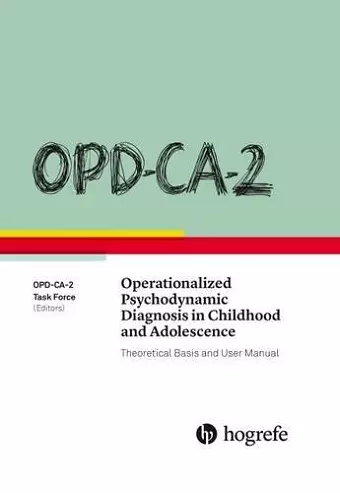OPD-CA-2 Operationalized Psychodynamic Diagnosis in Childhood and Adolescence: Theoretical Basis and User Manual
Format:Hardback
Publisher:Hogrefe Publishing
Published:31st Jan '17
Should be back in stock very soon

Following the success of the Operationalized Psychodynamic Diagnosisfor Adults (OPD-2), this multiaxial diagnostic and classificationsystem based on psychodynamic principles has now been adapted forchildren and adolescents by combining psychodynamic, developmental,and clinical psychiatric perspectives.The OPD-CA-2 is based on four axes that are aligned with the new dimensionalapproach in the DSM-5: I = interpersonal relations, II = conflict,III = structure, and IV = prerequisites for treatment. After an initialinterview, the clinician (or researcher) can evaluate the patient's psychodynamicsaccording to these axes to get a comprehensive psychodynamicview of the patient.Easy-to-use checklists and evaluation forms are provided. The set oftools and procedures the OPD-CA-2 manual provides have been widelyused for assessing indications for therapy, treatment planning, andmeasuring change, as well as providing information for parental work.
The OPD-CA-2, like the OPD-2, is a multiaxial diagnostic method, which goes beyond the DSM–5 and the ICD-10. ... [It] builds on the work of the OPD-2 and is obviously meant to be used in conjunction with the adult system. It provides a way of creating a focused structured interview and helps a clinician conduct a more comprehensive evaluation without being bothered by a particular psychodynamic theory. The book is dedicated to the attempt to provide clear operational evaluations of complicated psychological processes. ; Prof. Ronald Teague, founding core faculty member of the Fresno, Sacramento, and Hong Kong campuses of the California School of Professional Psychology, Alliant International University, in PsycCRITIQUES, vol. 62, 2017
ISBN: 9780889374898
Dimensions: 228mm x 152mm x 27mm
Weight: unknown
400 pages